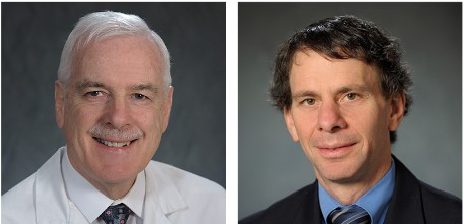
Now Enrolling: EA2234/STOPGAP II Study for Patients With Stomach Cancer Spread to the Abdominal Cavity
September 5, 2025From the Co-Chairs, September 2025


By Peter J. O’Dwyer, MD (left)
and Mitchell D. Schnall, MD, PhD
As we embark upon a new academic year, after a tumultuous spring and summer, reasons for optimism have emerged amid the uncertainty. As of this writing, both the US Senate Committee on Appropriations and the House Appropriations Subcommittee have advanced draft FY26 appropriations bills that include increases for the National Institutes of Health (NIH) and the National Cancer Institute (NCI). Though we will not know the outcome of these bills until later this month, these are positive developments. Additionally, in August, more than 100 organizations wrote to Congress expressing their support for the H.R.3521 - Clinical Trial Modernization Act. The Act, introduced in May 2025, is a bipartisan effort to help remove cost and geographic barriers to patient participation in clinical trials. Both this piece of legislation and Congress’s appropriations bills signal support, across both parties, for cancer research funding. The question of indirect costs is also a concern given inconsistency on the issue between House and Senate.
Recently, NIH Director Dr. Jay Bhattacharya took an important step in communicating to stakeholders, delivering extensive remarks to the National Cancer Advisory Board on September 4, 2025. He reiterated the administration’s support for cancer research, and in particular focused on his previously described priorities for the objectives of scientific inquiry in medical research. Issues that ECOG-ACRIN investigators have embraced in the past five years, including Real-World Data and Population Health, are prominent. Reproducibility, safety, and transparency are embedded in the core designs of our trials but probably should be emphasized. The goal of making “Big Advances” is of course our holy grail, and the motivation for embracing Big Data and for establishing the Data Science Committee.
Dr. Bhattacharya took questions after his remarks, and many focused on how to ensure that advances are applicable and available to the entire population. NCI Acting Director Dr. Doug Lowy next outlined the directions envisaged for NCI, and several concerns emerged. In particular, a directive that all grants should be fully funded for their entire duration (usually five years) was positive, as it gave researchers discretion in spending when resources and needs did not align. However, it also had the effect of driving the payline down to 4% for R01 grants. Dr. Lowy also focused on extending trial availability to rural areas, and on ways of accomplishing this. This was an informative public session, notwithstanding the many questions that will undoubtedly persist beyond the current budget negotiations.
For that reason, it remains important that we as a community articulate clearly the needs of our patients and of the research to help them. We must continue to advocate for the elimination of cancer as a health problem. Our goal is to keep you informed, as much as possible, through this newsletter, and to reach patients and their families through an expanded social media presence. Be sure to follow us on Bluesky, X, LinkedIn, Facebook, and Instagram for the latest updates. Cancer research is a non-partisan mission, and we must have a big tent for its successful conduct.
As usual, late August brought the Annual Meeting of the NCI Community Oncology Research Program (NCORP). We’re delighted to share that ECOG-ACRIN’s own Dr. Kathy Yost Butler was presented with the 2025 Harry Hynes Award for Outstanding Contributions to Clinical Trials and Community Research. This award is given in honor of Dr. Hynes, who established the Wichita Hematology Oncology Group, now known as the Cancer Center of Kansas, and was the founding principal investigator of the Wichita Community Clinical Oncology Program (CCOP). At ECOG-ACRIN, Dr. Yost serves as principal investigator for the Cancer Research Consortium of West Michigan NCORP and chair of the Community Advisory Committee. She is an exemplary cancer researcher and clinical oncologist and well-deserving of this award. Please join us in congratulating her.
Preparations for the semi-annual Group Meeting are underway, taking place Wednesday, October 22-Friday, October 24 in Philadelphia. Mark your calendars for our two plenary sessions, often the highlights of the meeting:
- The Comis Translational Science Symposium will take place on Wednesday, October 22 from 3:00-5:00 PM
- The General Session will take place on Thursday, October 23 from 5:30–7:30 PM
As a reminder, the Comis Symposium offers a focused examination of a particular field of scientific opportunity; past topics have included circulating marker technology, therapy optimization, and real-world data. The fall 2025 Symposium will focus on new ways to design clinical trials, and use-case scenarios for our committees. The General Session will feature discussions of high-priority issues in cancer research as well as previews of presentations intended for national meetings. This session will be followed by a reception, during which there will be time for discussion and networking—this year taking place at Philadelphia’s historic Reading Terminal Market. We hope to see you there!
Read the September 2025 issue here.
![ECOG-ACRIN logo[19516]275×75](https://blog-ecog-acrin.org/wp-content/uploads/2021/03/ECOG-ACRIN-logo19516275x75.png)
